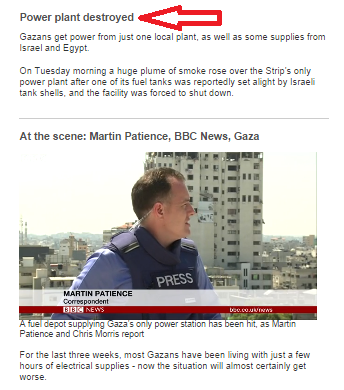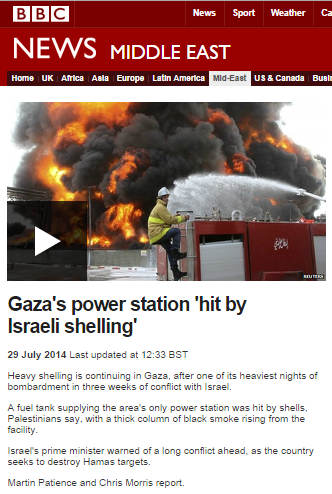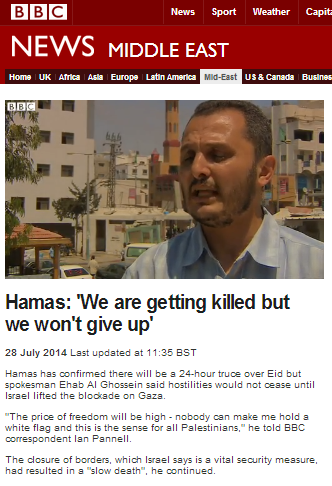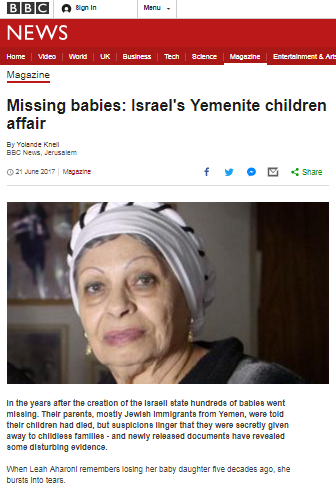Readers may recall that on July 29th 2014 the BBC devoted considerable coverage to the story of an explosion at a power plant in the Gaza Strip.
““Power plant destroyed” screamed the sub-heading in a BBC News website report on July 29th 2014.
That article was among numerous items produced by the BBC on the same day which included content relating to what the BBC immediately concluded was an Israeli strike on Gaza’s power station. BBC journalists extensively promoted that version of the story despite the fact that Israeli sources had stated that the power plant was not deliberately targeted.
Viewers of BBC television news programmes (along with visitors to the website) saw reports by Chris Morris, Ian Pannell and Martin Patience and Chris Morris. They heard statements such as the following one from Ian Pannell:
“Israel wants to weaken Hamas any way it can, which includes hitting Gaza’s only power station – adding to the misery of those who live here.”
Listeners to BBC World Service radio’s ‘Newshour‘ on July 29th heard Chris Morris make the following baseless allegation:
“And it is Gaza’s only power plant so there are electricity cuts in Gaza City, there could be problems with water supply because many of the area’s water pumps also rely on that power plant. So if that was a deliberate Israeli attempt to cause economic pain – which is certainly how most Palestinians will see it – then it could be fairly successful.” [emphasis added]
Just over two weeks later, both television viewers and visitors to the BBC News website were again reminded of the story in filmed and written reports by Yolande Knell.”
A year later, the claims of deliberate targeting of the power plant were shown to be false but no effort was made to correct the misleading impressions and inaccurate information in those reports which still remain available online.
The Military Attorney General has now published the result of investigations into the July 29th 2014 incident and previous ones at that power plant (section 4 here).
“In media reports, in IDF operational reports, and in the reports of international and non-governmental organizations, it was alleged that over the course of the period from 22 – 29 July 2014, the Gaza Strip’s power plant facilities, located in Nusseirat, were struck a number of times, as a result of IDF operations (the different sources refer to different events, and the allegations and figures contained therein are not consistent). It was further alleged, that as a result of the strike on the power plant on 29 July 2014, the plant ceased to function for a significant amount of time. Subsequently, the incident was referred to the FFA Mechanism for examination.
The factual findings, collated by the FFA Mechanism, and presented to the MAG, indicated that the power plant in Nusseirat was designated as a “sensitive site” on the relevant operational systems of the IDF. In accordance with the IDF’s operational instructions, any military operation to be conducted in the vicinity of such sites requires the adoption of special precautions. The findings further indicated that, in the course of the military activity taking place in the area, the power plant was struck four times over the course of the period from 22-29 July 2014 (the difficulty in specifying the precise dates of the strikes results from differences between the various reports, which provide different dates for the same strikes).
In regard to the first three incidents of damage to the power plant, it was found that the damage did not occur as the result of any direct or intentional attack, aerial or otherwise, by IDF forces. The FFA Mechanism could not rule out the possibility that the power plant facilities may have been damaged by shrapnel, or artillery fire that went off course during the combat. This, in light of the considerable military activity that took place in the vicinity of the plant, between IDF forces and squads affiliated with terror organizations. As well as in light of the fact that terror organizations located a large number of terror assets adjacent to the power plant – at times at a distance of mere tens of meters (such assets included launching pits in which rockets and mortars were stored, medium range rocket launchers, the openings of combat tunnels, weapons caches and more). Evidence has also been obtained which indicates that a portion of the damage may have been caused as the result of rocket fire by Palestinian terror organizations. […]
As regards the fourth incident of damage, which occurred on 29 July 2014, the FFA Mechanism found that on the day of the incident, an IDF armored force operating in the area identified a squad of terror operatives, bearing anti-tank weaponry (“anti-tank squad”). The anti-tank squad was identified while it was close to what would later turn out to be the fuel tanks of the power plant. In light of the imminent threat posed by the squad to the armored force, the force fired, in a measured and direct manner, at the anti-tank squad, using the most precise munition the force had at its disposal. It appears, that as a result of this fire, one of the power plant’s fuel tanks was damaged (the power plant itself was not hit).It was further found, that the IDF force which carried out the fire, did not make the connection between the facilities, in proximity to which it identified the anti-tank squad, and the power plant, and was not aware that the structures in question contained flammable material.
After reviewing the factual findings and the material collated by the FFA Mechanism in regard to this incident, the MAG found that the targeting process carried out with regard to the anti-tank squad accorded with Israeli domestic law and international law requirements.
The fire which was carried out by the IDF force over the course of the incident was aimed at a military object – an anti-tank squad of the terror organizations, which posed an immediate threat to the force. The attack on the squad complied with the principle of proportionality, as at the time the decision to attack was taken, it was considered that the collateral damage expected to arise as a result of the attack would not be excessive in relation to the military advantage anticipated from it. This estimation was not unreasonable under the circumstances, when taking into consideration the immediacy of the threat posed to the force by the anti-tank squad, and in light of the fact that the force was not aware of the nature of the facilities in proximity to which they identified the squad.” [emphasis added]
Nevertheless, members of the public can still find BBC material online which inaccurately portrays the July 29th 2014 incident as a deliberate strike on that power plant. Clearly the appropriate clarifications need to be urgently added to those reports.
Related Articles:
The BBC and the ‘destroyed’ Gaza power plant
BBC claims about 2014 Gaza power plant incident shown to be false




